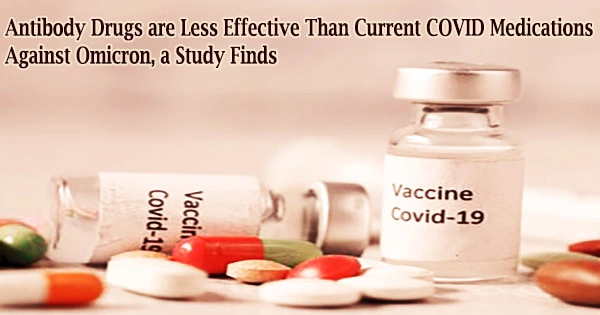In lab studies, the medications used to create the brand-new COVID-19 pills are still quite effective against the virus’s omicron version.
The existing antibody therapies, which are normally administered intravenously in hospitals, are far less effective against omicron than against earlier versions of the virus, according to laboratory experiments. At realistic doses, some antibodies have completely lost their capacity to neutralize omicron.
It would be encouraging news if the antiviral medications’ effectiveness against omicron was validated in human patients. Public health officials anticipate that the pills will be used more frequently as a COVID-19 treatment, reducing the severity of the illness in at-risk patients and lessening the impact of the pandemic.
The current omicron wave, which has broken case records in the U.S. and other nations, is keeping the medicines scarce for the time being. The results support those of other studies showing that omicron is more resistant to the majority of currently used antibody therapies.
To address the limits of current medicines, pharma producers could create, test, and produce new antibody medications that were targeted at the omicron variation, but this process would take months. Two new medications for COVID-19 have been recommended by WHO, adding even another choice for treatment.
How extensively and affordably these medications are made available will determine how many lives they will save. Patients with severe or critical COVID-19 are highly advised to use the first medication, baricitinib.
It belongs to a group of medicines called Janus kinase (JAK) inhibitors that prevent the immune system from becoming overstimulated. The WHO advises giving it together with corticosteroids. Rheumatoid arthritis is treated with the oral medication baricitinib. The WHO advised against using Interleukin-6 receptor blockers, another type of arthritic medication, in July 2021.
“The bottom line is we have countermeasures to treat omicron. That’s good news,” says Yoshihiro Kawaoka, the University of Wisconsin-Madison lead of the study and virologist at the UW School of Veterinary Medicine and the University of Tokyo. “However, this is all in laboratory studies. Whether this translates into humans, we don’t know yet.”
On January 26, 2022, Kawaoka and his associates at the National Institute of Infectious Diseases in Tokyo and the University of Wisconsin–Madison published their research in the New England Journal of Medicine.
The bottom line is we have countermeasures to treat omicron. That’s good news; however, this is all in laboratory studies. Whether this translates into humans, we don’t know yet.
Yoshihiro Kawaoka
Sotrovimab, a monoclonal antibody medication, has also been conditionally recommended by WHO for the treatment of mild or moderate COVID-19 in patients who are at high risk of hospitalization. This includes older individuals, immunocompromised people, patients with underlying illnesses like diabetes, hypertension, and obesity, as well as unvaccinated patients.
Casirivimab-imdevimab, a monoclonal antibody combination that the WHO recommended in September 2021, can be substituted with sotrovimab. The effectiveness of monoclonal antibodies against Omicron is still being investigated, but preliminary laboratory findings indicate that sotrovimab retains its activity.
Before scientists discovered the omicron variation, which differs dramatically from prior variants of the virus, the therapeutically accessible tablets and antibodies were created and tested. When omicron was discovered, researchers worried that these variations, brought on by mutations in the viral genome, might lessen the efficacy of medications created to treat the original strain of the virus.
Kawaoka’s team evaluated a variety of antibody and antiviral therapy against the original strain of the COVID-19 virus and its well-known variations, including the alpha, delta, and omicron strains, in laboratory tests using non-human primate cells.
The intravenous medicine remdesivir and the tablet molnupiravir made by Merck were equally successful against the omicron variation as they had been against prior virus strains. The team experimented with an intravenous version of a Pfizer medicine instead of testing the oral Paxlovid pill, which is intended to be taken.
The viral machinery is disrupted by both medications in a similar way. The researchers found the drug’s intravenous form, which is presently undergoing clinical testing, to retain its efficacy against omicron.
The effectiveness of all four antibody therapies was lower against omicron than it was against previous strains of the virus. The ability to neutralize the virus was nevertheless partially retained by two medications, sotrovimab from GlaxoSmithKline and Evusheld from AstraZeneca.
However, compared to prior versions, they needed anywhere between 3 and 100 times more of the medications to neutralize omicron. The use of AstraZeneca’s antibodies is not permitted in the United States. At typical dosages, two antibodies developed by Lilly and Regeneron failed to neutralize omicron.
These results were predicted given how the SARS-CoV-2, or COVID-19 virus, omicron form varies from prior strains. The spike protein, which the virus utilizes to enter and infect cells, contains dozens of changes in Omicron.
Major modifications to the protein may reduce the likelihood that antibodies will bind to it because the majority of antibodies were created to bind to and neutralize the original spike protein. The molecular apparatus the virus utilizes to replicate itself inside cells is the focus of the antiviral medications, in contrast.
Since the machinery in the omicron variety has undergone very few alterations, it is more likely that medications will continue to be able to interfere with this reproduction process. To find novel antibody candidates that could neutralize the omicron version, the Kawaoka lab is now researching new antigens.
This work was supported in part by the National Institutes of Health (grants HHSN272201400008C and 75N93021C00014) and the Department of Defense (grant W911QY2090012).
The study was also supported by the Japan Research Program on Emerging and Reemerging Infectious Diseases (grants JP20fk0108412, JP21fk0108615, and JP21fk0108104), a Project Promoting Support for Drug Discovery (grant JP20nk0101632), the Japan Program for Infectious Diseases Research and Infrastructure (grant JP21wm0125002), and a Grant-in-Aid for Emerging and Reemerging Infectious Diseases from the Ministry of Health, Labor, and Welfare, Japan (grant 20HA2007).
















